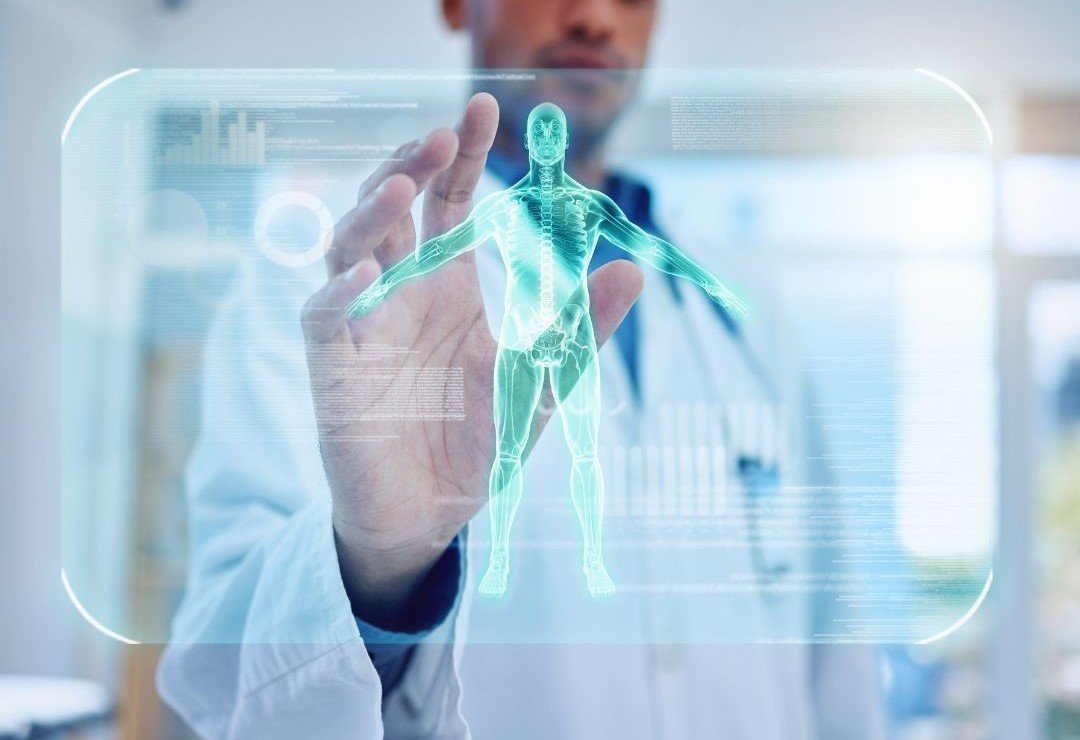Welcome, corporate leaders and industry innovators! In the ever-evolving world of healthcare, artificial intelligence (AI) stands as a beacon of transformative potential. Just as you strategize to stay ahead in business, understanding AI’s impact on health can be our next big move. In this concise guide, we dive into the possibilities that AI offers for revolutionizing healthcare, supported by insights from leading experts in the field citing recent peer-reviewed science-based studies.
How AI is Transforming Diagnostics, Personalizing Medicine, and Predicting Illness for a Healthier Future

In the ever-evolving world of healthcare, artificial intelligence (AI) stands as a beacon of transformative potential. Just as you strategise to stay ahead in business, understanding AI’s impact on health can be our next big move. In this concise guide, we dive into the possibilities that AI offers for revolutionising healthcare, supported by insights from leading experts in the field, citing recent peer-reviewed science-based studies.
The AI Revolution in Healthcare
Enhanced Diagnostics
AI has demonstrated remarkable abilities in medical imaging and disease diagnosis, often surpassing human experts. For example, AI can detect early signs of diseases in retinal scans that even the best-trained ophthalmologists might miss. This advancement is not just about doing what doctors do, but about doing it better and earlier, leading to more effective treatments and improved patient outcomes.
Key Points:
- Advanced Imaging: AI can predict conditions like Alzheimer's and Parkinson's years before symptoms appear. A study published in Nature Communications shows that AI can analyze MRI images to predict the onset of Alzheimer's disease years before clinical symptoms appear.
- Broad Application:AI enhances interpretations of CT scans, MRIs, and other medical images, providing more accurate diagnoses. According to a review in Nature Reviews Cancer, AI improves the interpretation of various imaging modalities, leading to better diagnostic accuracy and patient outcomes.
Personalized Medicine
AI’s ability to process vast amounts of data enables it to tailor medical care to individual needs. This approach, known as precision medicine, takes into account genetic, environmental, and lifestyle factors to develop personalised treatment plans.
Key Points:
- Genomic Data: AI can integrate genetic information with other health data to predict disease risks and tailor treatments. Research published in Cancer Discovery highlights AI's role in combining genomic data with other health information to customize treatments effectively.
- Patient-Specific Insights: This allows for interventions that are specifically suited to each patient’s unique health profile. An article in Health Affairs discusses how AI-driven precision medicine personalizes interventions based on genetic, environmental, and lifestyle factors.
Predictive Analytics
AI’s predictive capabilities extend to forecasting potential health issues before they manifest. By analysing patterns in big data, AI can provide early warnings and suggest preventive measures, transforming how we approach chronic diseases.
Key Points:
- Preventive Medicine: AI can identify high-risk individuals and recommend lifestyle changes or early interventions to prevent diseases. A study in Applied & Translational Genomics details how AI analyzes large datasets to identify high-risk individuals and recommend preventive measures.
- Continuous Monitoring:Wearable devices and sensors provide real-time health data, which AI analyzes to detect anomalies early. Research in Digital Medicine shows how AI, combined with data from wearable devices, can monitor health in real-time and suggest preventive actions.
Checklist for Successful AI Integration:
- Gather Compelling Evidence:Conduct large-scale studies to validate AI’s effectiveness in real-world settings
- Revise Medical Education: Update curricula to include AI training for future healthcare professionals
- Regulatory Frameworks: Develop guidelines to ensure AI applications are safe, ethical, and effective
- Patient Trust and Acceptance: Educate patients on the benefits and limitations of AI to build trust and acceptance
The Future of AI in Healthcare

Restoring the Patient-Doctor Relationship
AI can alleviate the administrative burdens on healthcare professionals, allowing them to focus more on patient care.
This imbalance detracts from the quality of the patient-doctor interaction, often leading to decreased patient satisfaction and increased physician burnout. AI technologies, such as natural language processing and automated documentation systems, can mitigate these burdens by streamlining administrative workflows and reducing the time doctors spend on data entry. This “keyboard liberation” allows doctors to engage more fully with their patients, fostering a deeper human connection that is crucial for effective diagnosis and treatment. Research has shown that enhanced patient-doctor communication leads to better health outcomes, including improved patient adherence to treatment plans and higher levels of patient trust and satisfaction. By leveraging AI to handle routine administrative tasks, healthcare professionals can devote more time and attention to patient care, ultimately restoring and strengthening the essential human element of medical practice.
These digital assistants leverage advanced algorithms and data analysis to tailor recommendations to individual needs, addressing factors such as diet, exercise, medication adherence, and mental well-being. Research indicates that virtual health coaches can improve patient engagement and outcomes, particularly for those with chronic conditions like diabetes and hypertension. By providing continuous, real-time guidance and monitoring, they help patients make informed decisions, potentially reducing hospital visits and healthcare costs. This technological advancement not only enhances patient autonomy but also alleviates the burden on healthcare professionals, allowing them to focus on more complex cases.

Virtual Health Coaches
AI-powered virtual health coaches can provide personalized advice and support for managing chronic conditions and maintaining overall health, reducing the strain on healthcare systems.

Advancing Medical Research
AI accelerates medical research by analyzing vast datasets to uncover new insights into diseases and treatments. This can lead to faster discovery of cures and more effective treatments.
This capability enables the identification of patterns and correlations that might be missed by human analysis alone. For instance, AI algorithms can sift through millions of medical records to uncover new insights into disease mechanisms and potential treatment targets. This accelerates the discovery process, allowing for faster development of cures and more effective, personalized treatments. Studies have shown that AI can significantly reduce the time required for drug discovery and development, potentially saving years of research and billions of dollars in costs. Furthermore, AI’s predictive analytics can improve patient outcomes by identifying high-risk individuals and enabling early intervention. Thus, AI is not only transforming the pace of medical research but also enhancing the precision and efficacy of healthcare.
Conclusion
Artificial intelligence holds the promise to not only enhance the efficiency and accuracy of medical care but also to make healthcare more personalized and humane. As we stand on the brink of this technological revolution, embracing AI could lead to a seismic shift in how we approach health and wellness.
By staying informed and proactive, you can leverage AI’s potential to improve health outcomes, streamline operations, and ultimately create a healthier future for all. So, let’s step into the future of medicine with AI as our ally, transforming challenges into opportunities for a better, healthier world.
References:
- Topol, E. "Deep Medicine: How Artificial Intelligence Can Make Healthcare Human Again.
- Hyman, M. "Towards an Optimal Diet." Ground Truths Newsletter.
- Journal of the American Medical Association (JAMA). "Development and Validation of a Deep Learning Algorithm for Detection of Diabetic Retinopathy in Retinal Fundus Photographs.
- Nature Communications. "A Deep Learning Model to Predict Alzheimer’s Disease Progression in Imaging and Clinical Data.
- Nature Reviews Cancer. "Artificial Intelligence in Medical Imaging: Opportunities, Applications and Risks.
- Cancer Discovery. "Artificial Intelligence in Genomics and Precision Medicine.
- Health Affairs. "Precision Medicine: From Science to Value.
- Applied & Translational Genomics. "Artificial Intelligence for Predictive Healthcare.
- Digital Medicine. "Wearable Devices and Artificial Intelligence for Disease Prevention.



